
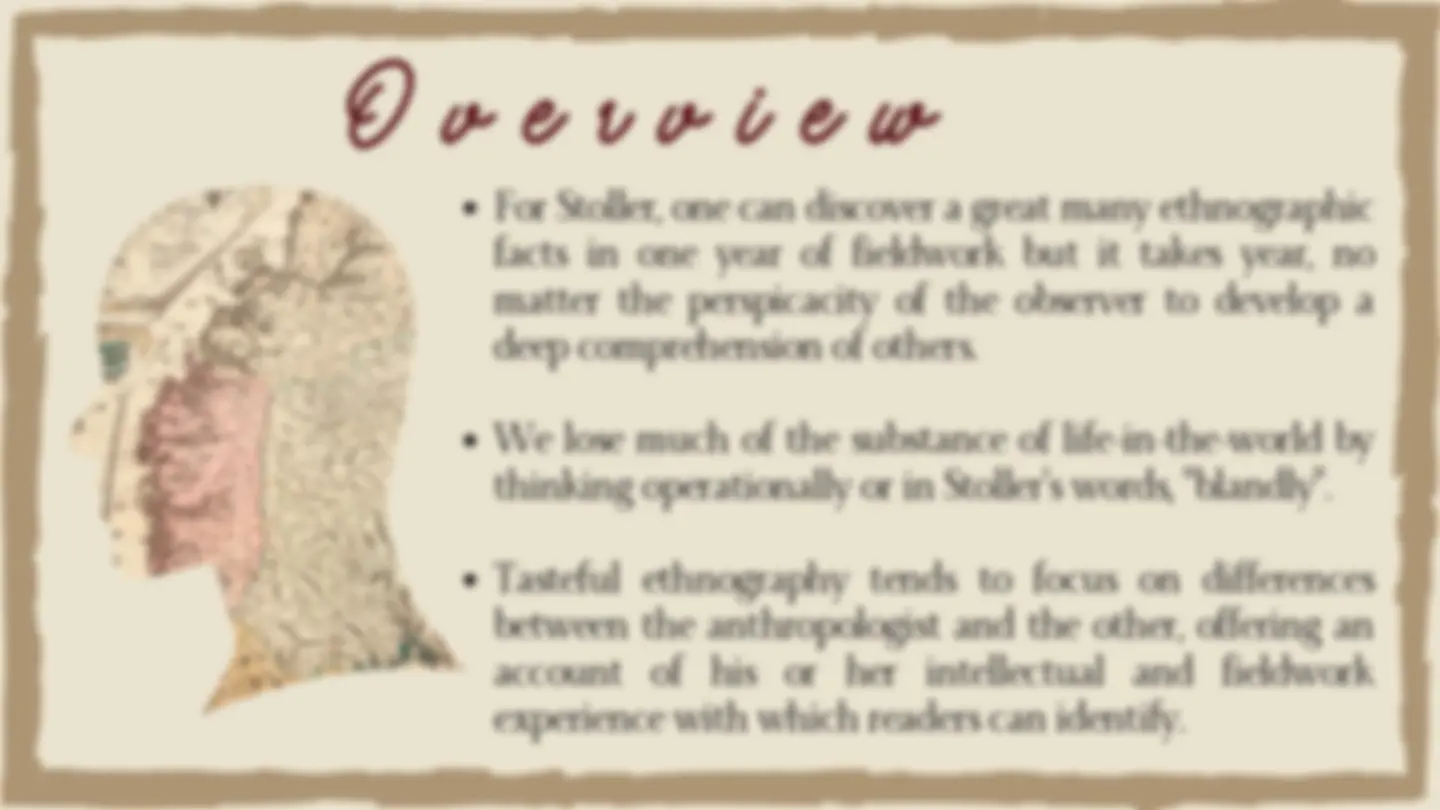
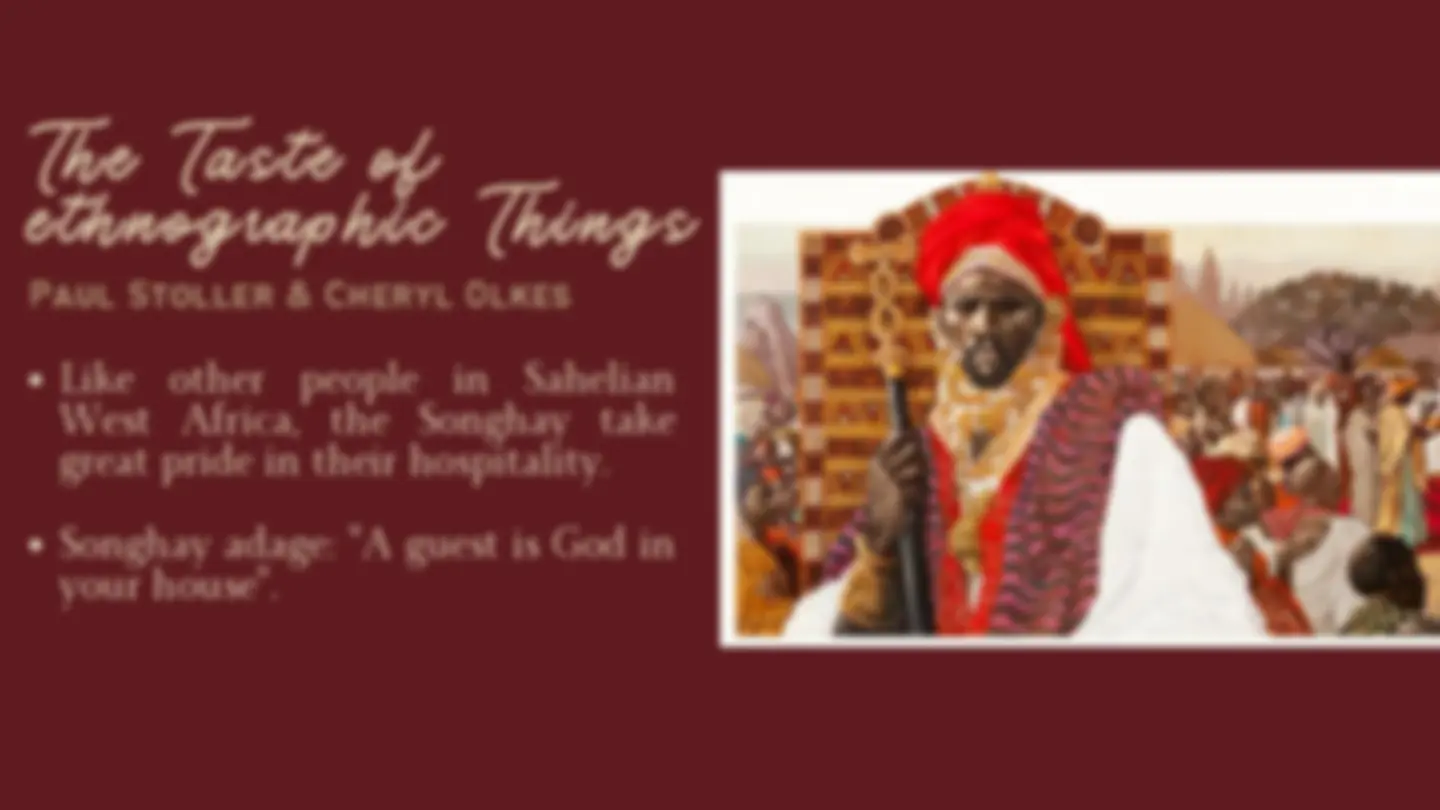
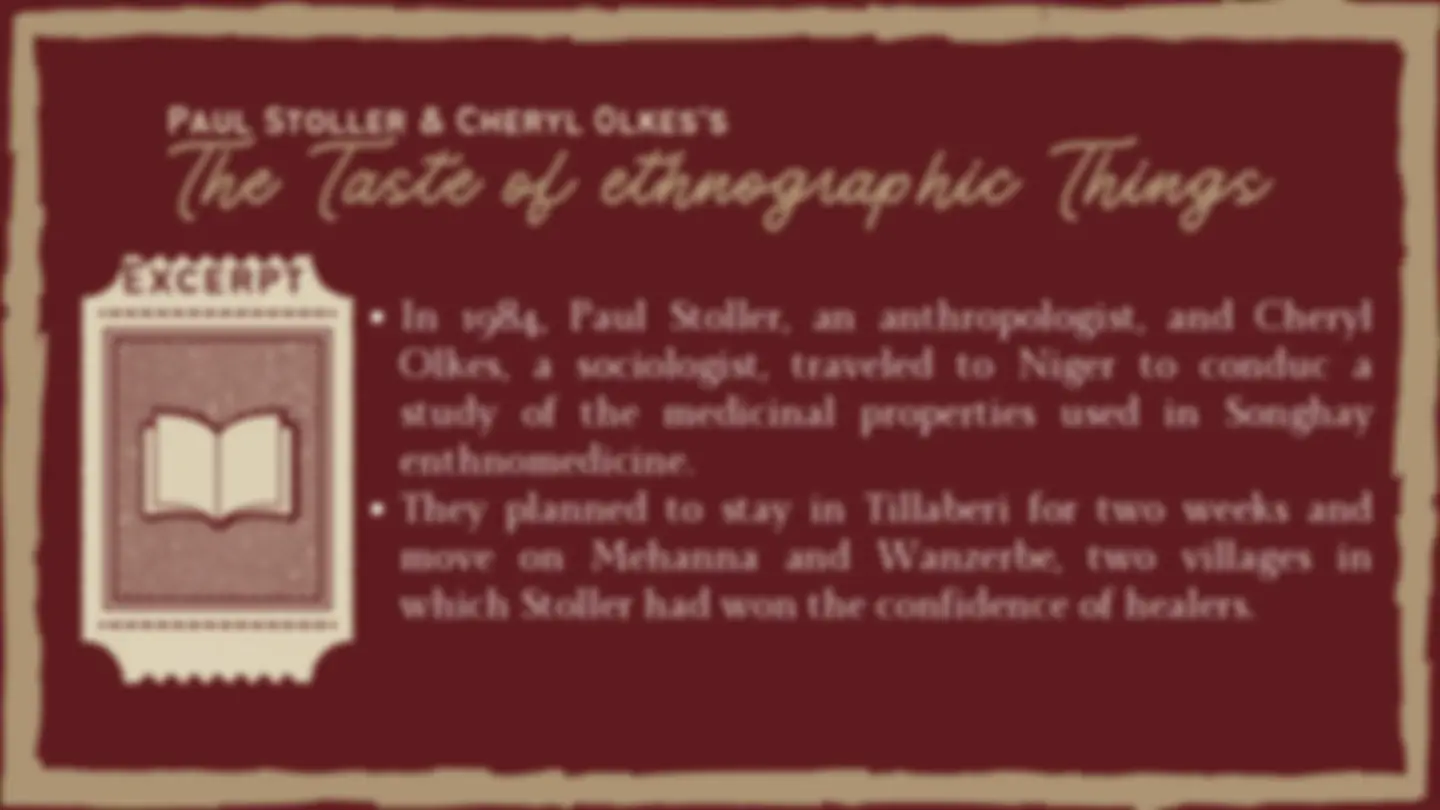
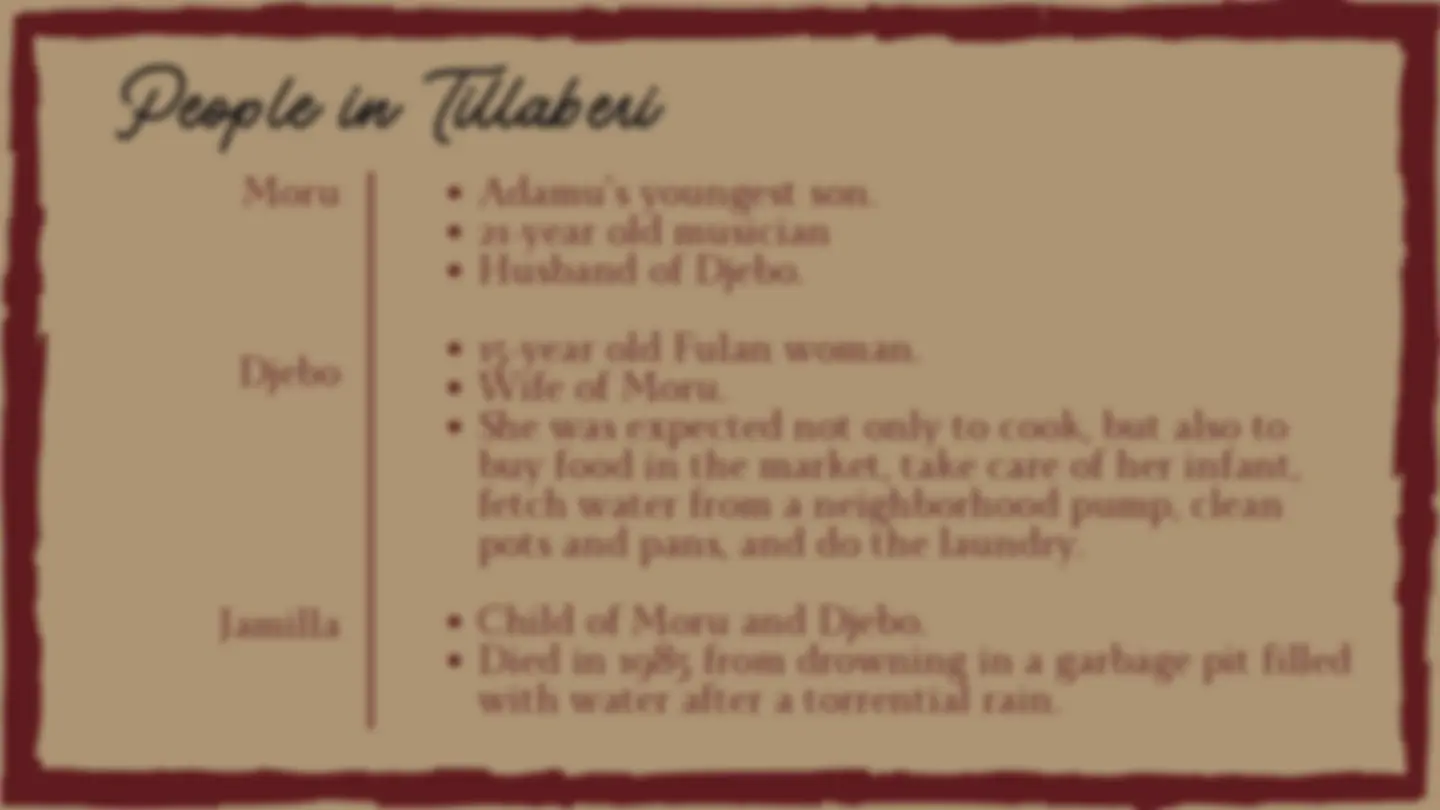
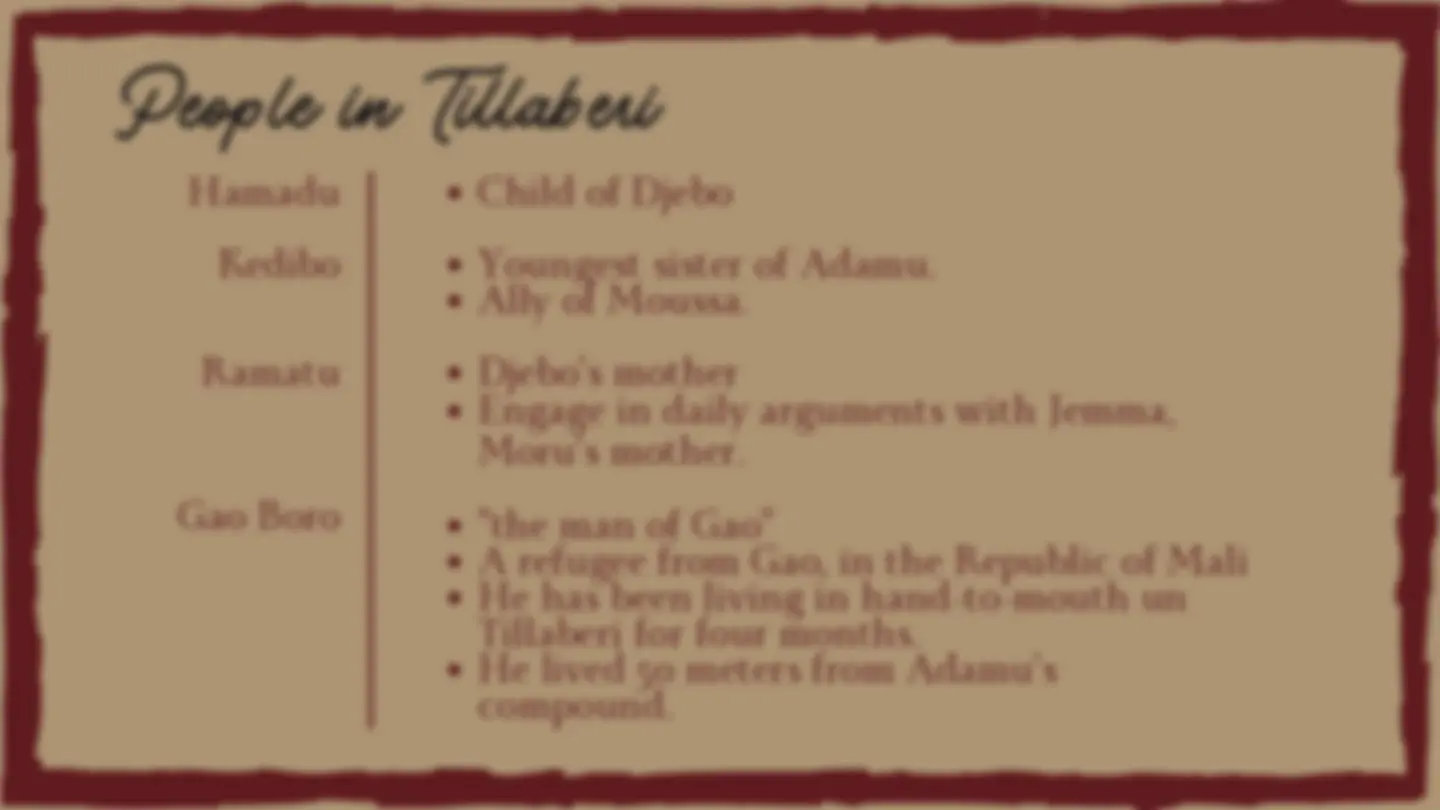
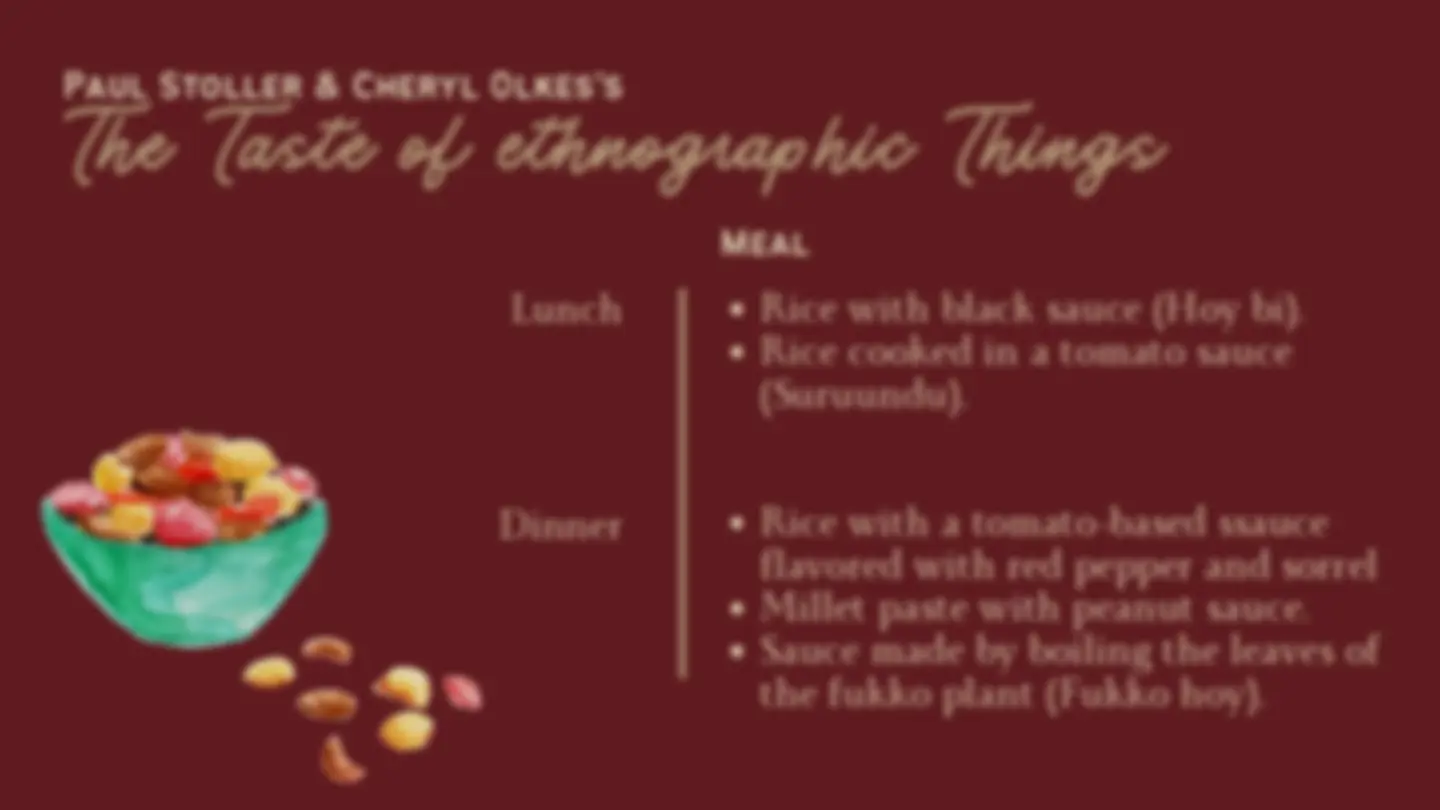
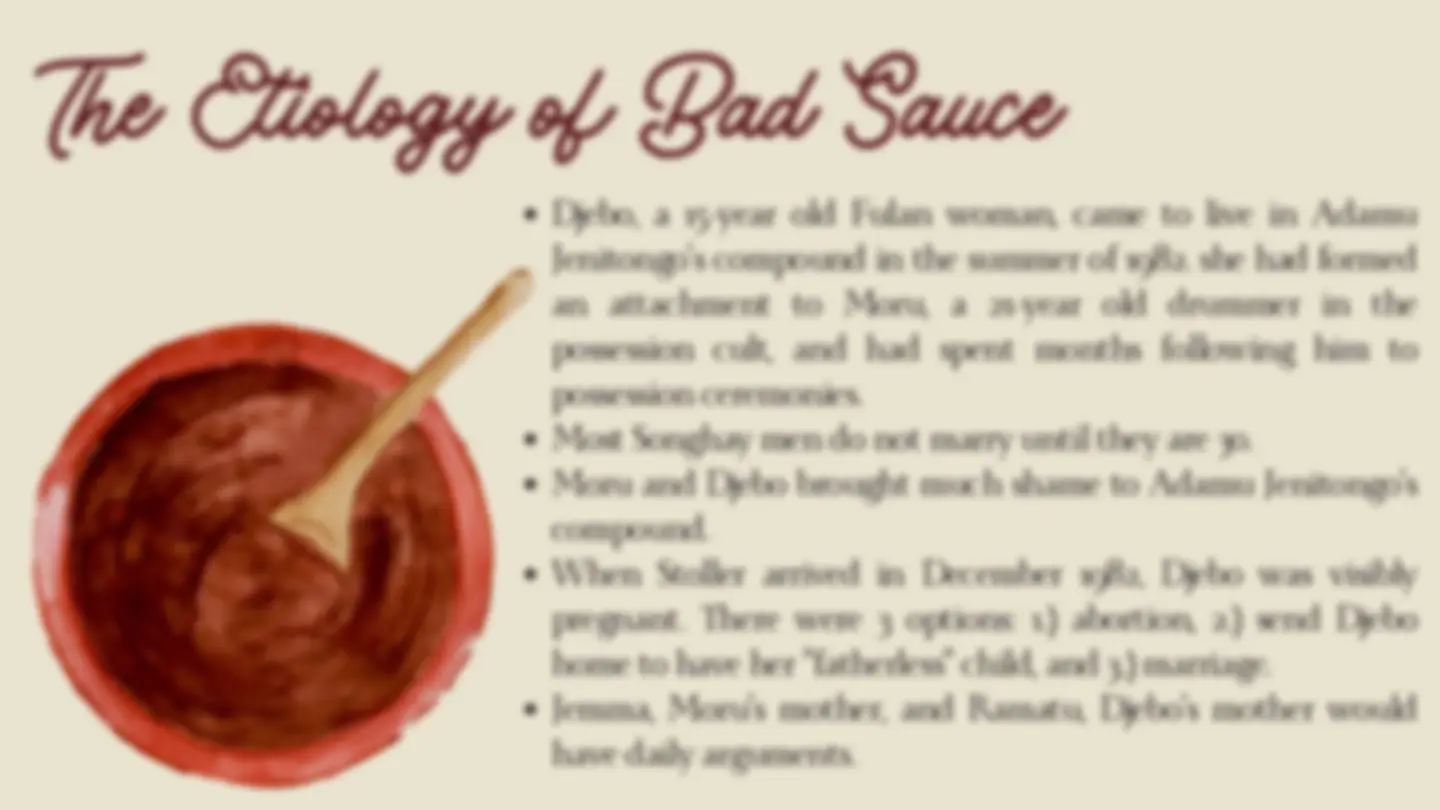
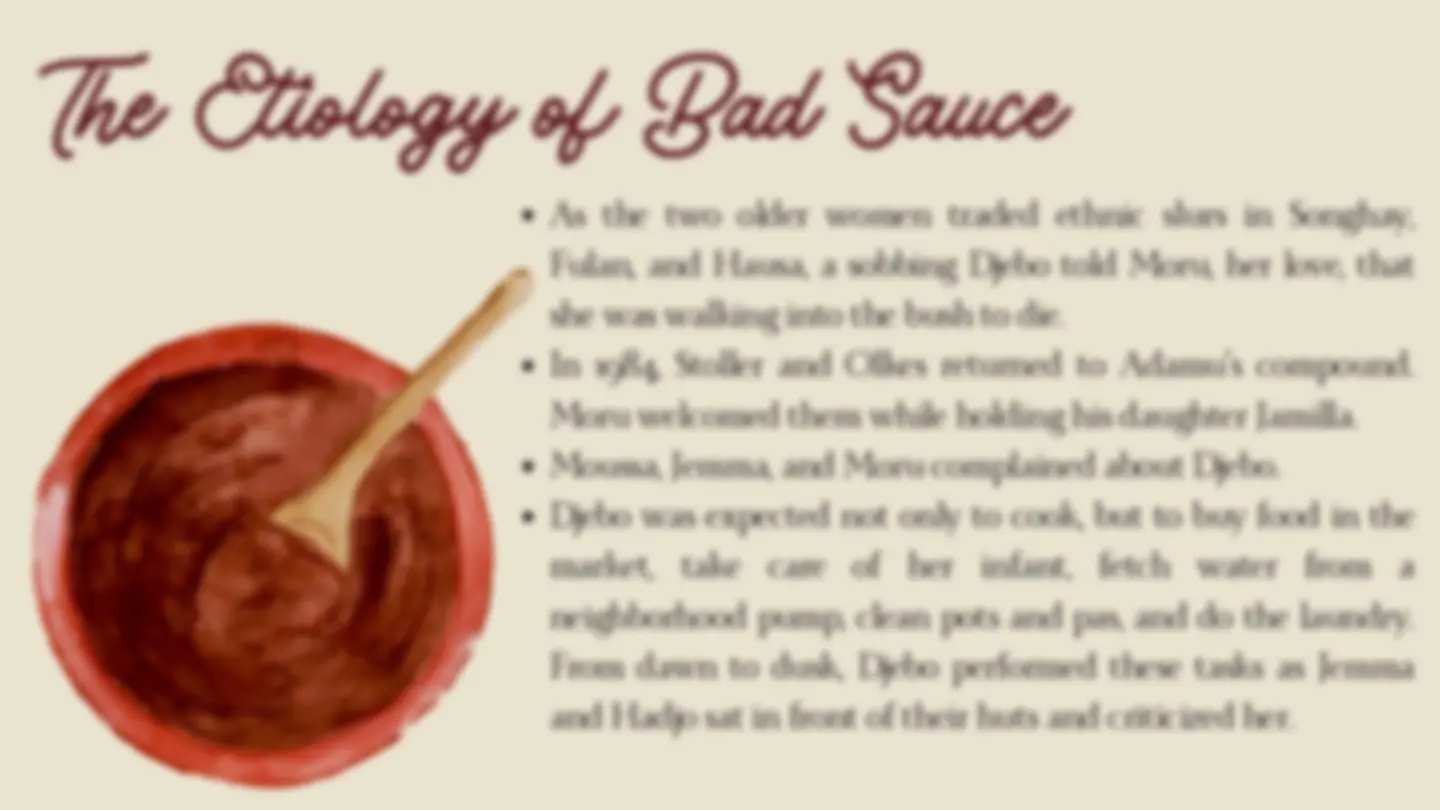
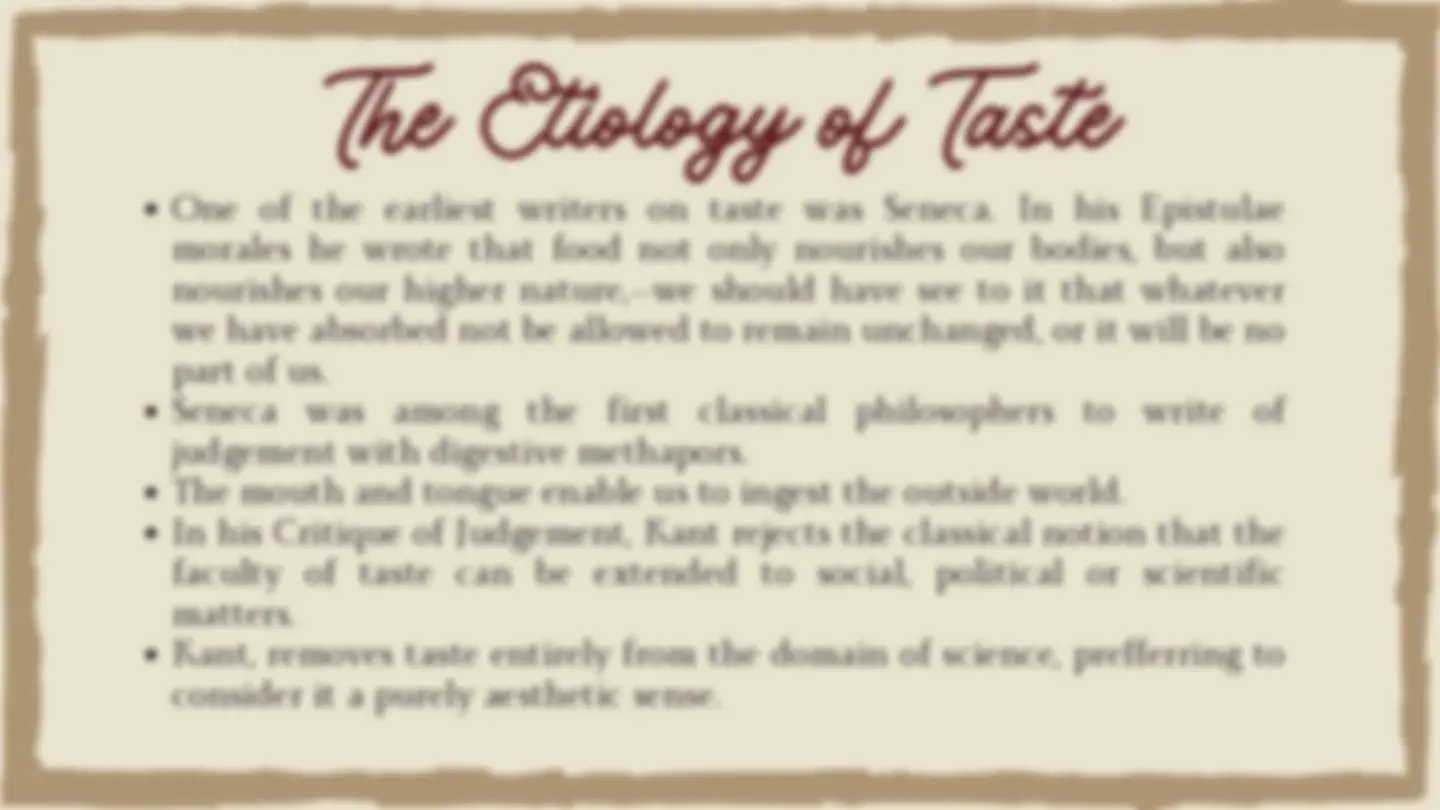
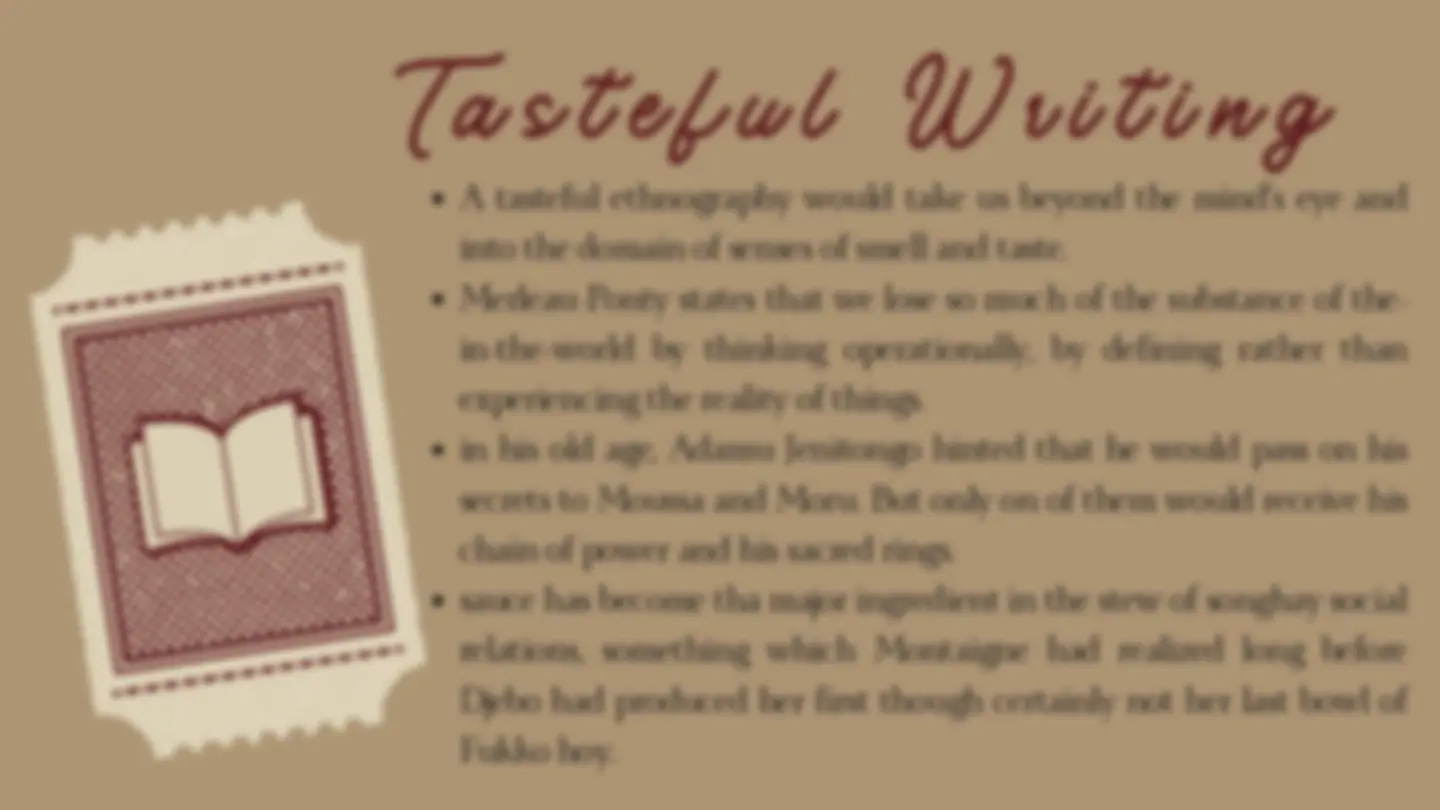



Study with the several resources on Docsity

Earn points by helping other students or get them with a premium plan


Prepare for your exams
Study with the several resources on Docsity

Earn points to download
Earn points by helping other students or get them with a premium plan
Community
Ask the community for help and clear up your study doubts
Discover the best universities in your country according to Docsity users
Free resources
Download our free guides on studying techniques, anxiety management strategies, and thesis advice from Docsity tutors
An insight into the experiences of anthropologist paul stoller as he conducts fieldwork in the songhay communities of niger and mali. The text focuses on stoller's interactions with local healers, their hospitality, and the significance of food and taste in songhay culture. The document also touches upon the challenges faced by stoller and his colleague cheryl olkes during their research and the role of food in songhay social relations.
Typology: Slides
1 / 19

This page cannot be seen from the preview
Don't miss anything!












An anthropologist who has been in the field for atleast 30 years. His early work is about the religion of Songhay people who live in the Republics of Niger and Mali in West Africa. Primarily focused on magic, sorcery, and spirit possession practices. Published 12 books, including ethnographies, biographies, memoirs, and two novels. Blogging Bliss (essay, Anthropology Now 2013 edition) Yaya's Quest: The Quest for Wellbeing in the World (Book, 2014) Paul Stoller
The Taste of ethnographic Things Paul Stoller & Cheryl Olkes
The Taste of ethnographic Things Paul Stoller & Cheryl Olkes's Excerpt In 1984, Paul Stoller, an anthropologist, and Cheryl Olkes, a sociologist, traveled to Niger to conduc a study of the medicinal properties used in Songhay enthnomedicine. They planned to stay in Tillaberi for two weeks and move on Mehanna and Wanzerbe, two villages in which Stoller had won the confidence of healers.
People in Tillaberi Adamu Jenitongo Jemma Hadjo Moussa Stoller had known him for 15 years. Most knowledgeable healer in all western Niger. Have two wives, Jemma and Hadjo. One of Adamu's wife. One of Adamu's wife. Mother of Moussa. Adamu's eldest son. He lent his mudbrick house to Stoller and Olkes. He worked as a tailor.
People in Tillaberi Moru Djebo Jamilla Adamu's youngest son. 21-year old musician Husband of Djebo. 15-year old Fulan woman. Wife of Moru. She was expected not only to cook, but also to buy food in the market, take care of her infant, fetch water from a neighborhood pump, clean pots and pans, and do the laundry. Child of Moru and Djebo. Died in 1985 from drowning in a garbage pit filled with water after a torrential rain.
The Taste of ethnographic Things Paul Stoller & Cheryl Olkes's Lunch Dinner Rice with black sauce (Hoy bi). Rice cooked in a tomato sauce (Suruundu). Rice with a tomato-based ssauce flavored with red pepper and sorrel Millet paste with peanut sauce. Sauce made by boiling the leaves of the fukko plant (Fukko hoy). Meal
Important Dates 1982 1984 Djebo, who was pregnant with Moru's child, lived in Adamu Jenitongo's compund in the summer. In this same year, Stoller arrived in Adamu's compund. Stoller and Olkes returened to Adamu's compund to conduct a study of the medicinal properties of plants used in Songhay ethnomedicine. Moussa worked as a tailor; his atelier was in his father's compound.
Djebo, a 15-year old Fulan woman, came to live in Adamu Jenitongo's compound in the summer of 1982. she had formed an attachment to Moru, a 21-year old drummer in the possession cult, and had spent months following him to possession ceremonies. Most Songhay men do not marry until they are 30. Moru and Djebo brought much shame to Adamu Jenitongo's compound. When Stoller arrived in December 1982, Djebo was visibly pregnant. There were 3 options: 1.) abortion, 2.) send Djebo home to have her "fatherless" child, and 3.) marriage. Jemma, Moru's mother, and Ramatu, Djebo's mother would have daily arguments. The Etiology of Bad Sauce
The Etiology of Bad Sauce As the two older women traded ethnic slurs in Songhay, Fulan, and Hausa, a sobbing Djebo told Moru, her love, that she was walking into the bush to die. In 1984, Stoller and Olkes returned to Adamu's compound. Moru welcomed them while holding his daughter Jamilla. Moussa, Jemma, and Moru complained about Djebo. Djebo was expected not only to cook, but to buy food in the market, take care of her infant, fetch water from a neighborhood pump, clean pots and pas, and do the laundry. From dawn to dusk, Djebo performed these tasks as Jemma and Hadjo sat in front of their huts and criticized her.
The Etymology of Taste in English Raymond Williams writes that the word taste came into English language around the thirteenth centurry, but its earliest meaning was closer to "touch" or "feel". "Taste" come to us from the Old French taster, and from the Italian tastare, which translates to "feel, handle, or touch". "Good taast" in the sense of good understanding was recorded in 1425. Djebo's sense of taste is sensual and subjective; Kant's sense of taste is rarefied and objective.
The Etymology of Taste in English Marcus and Cushman have suggested that conventions governing ethnographic representation devolve realism. Fabian writes of his concern about anthropology's intellectual imperialism: "Perhaps I failed to make it clear that I wanted language and communication to be understood as a kind of praxis in which the knower cannot claim ascendency over the known. As I see it now, the anthropologist and his interlocuters only know when they meet each other in one and the same contemporality."
Thank You for listening!